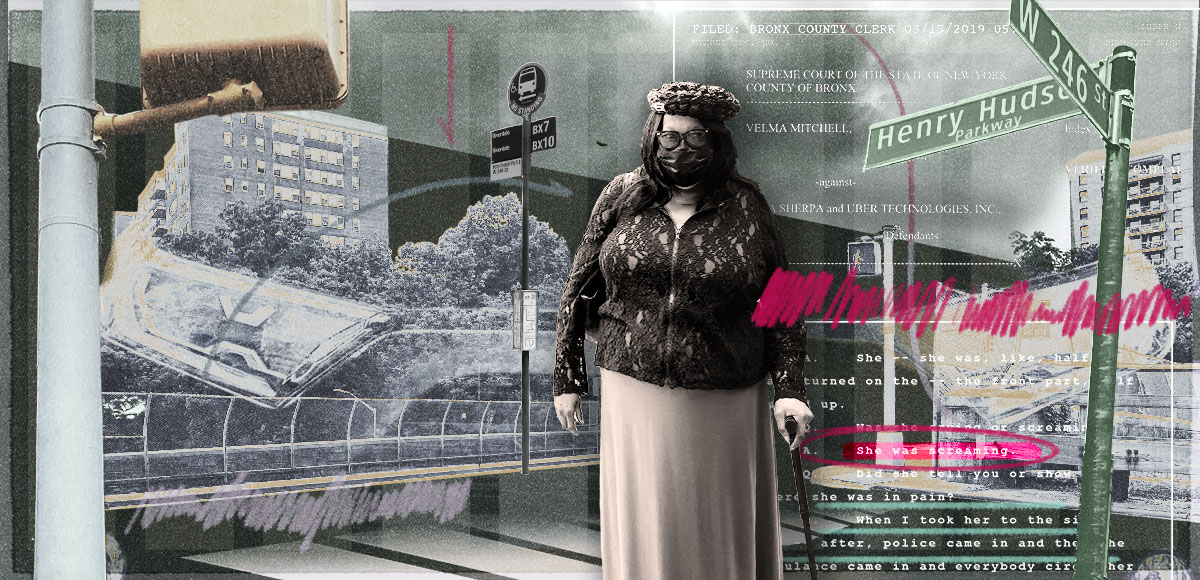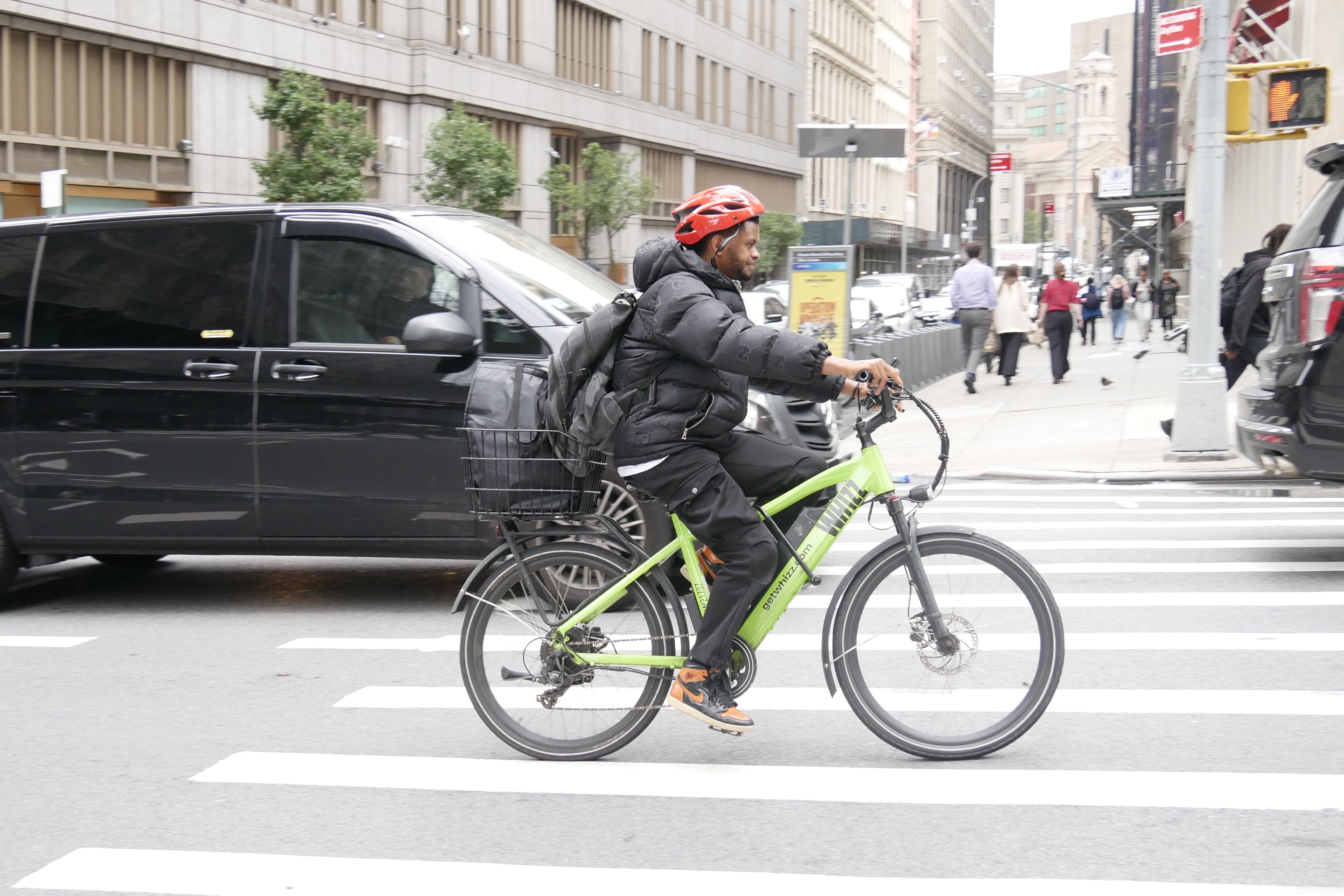Mayor de Blasio will not close a gap in insurance requirements that allows Uber and Lyft taxi drivers to have far less coverage when they are carrying passengers in New York City than anywhere else in the state.
Following a Streetsblog investigation showing how that disparity shortchanges the city's crash victims, the mayor's office told Streetsblog that the city's lower insurance requirements for Uber and Lyft taxis do not need to be changed, even though they leave far less compensation available for some crash victims in the city than elsewhere in New York.
"Coverage in New York City is tailored to the reality of driving here, which is very different than driving elsewhere in the state," de Blasio spokesman Mitch Schwartz said in a statement. Drivers licensed by the city's Taxi and Limousine Commission, including Uber and Lyft cabbies, "are subject to rigorous vehicle safety, driver safety, and insurance requirements, and those standards will continue keeping New Yorkers safe and holding bad drivers accountable.”
Attorneys for people injured by Uber and Lyft drivers told Streetsblog that individual crash victims in the city rarely receive much more from vehicle owners for their pain and suffering than the $100,000 in TLC-mandated liability insurance, a sum that often fails to match the true cost of their injuries.
The mayor's decision will keep in place minimum insurance levels that have not changed in more than two decades, even as the cost of medical bills has soared. Those minimums consist of $100,000 in liability insurance per person, $200,000 in "no-fault" insurance and the state minimums for uninsured motorist coverage.
Some of those requirements are significantly less than those mandated elsewhere in New York State for Ubers and Lyfts when they accept fares or carry passengers. Then, the cars must be covered by $1.25 million in liability insurance, $50,000 in no-fault insurance and $1.25 million in uninsured motorist coverage.
Liability insurance compensates crash victims for their pain and suffering. No-fault insurance is meant to promptly compensate them for medical bills and lost wages. Uninsured motorist coverage kicks in when someone is hit by a driver with little or no car insurance.
The city is permitted to have the lower minimums because the state exempts the city from its requirements.
De Blasio's office defended the mayor's position, arguing that the insurance requirements for Uber and Lyft taxis are stronger in the city than elsewhere in the state. The city's requirements are in effect at all times, while the state's $1.25-million requirement is only in effect when drivers accept a fare or carry a passenger.
When they haven't accepted a fare, the state's requirements are lower than the city's. And when they aren't logged into the ride-hail apps, Uber and Lyft drivers outside the city are only covered by their own private car insurance, which is likely even lower.
The city also requires for-hire vehicles drivers to get TLC licenses, take safety courses and submit to other safety protocols.
Still, there's far less insurance available to compensate people hit by Uber or Lyft taxis that are carrying passengers in New York City than anywhere else in the state. The consequences of this disparity are especially clear to people like Velma Mitchell, who was hit in a Bronx crosswalk by an Uber carrying a passenger less than two miles from the city's border with Westchester County in 2019.
After the crash, Mitchell spent months in the hospital and then a rehabilitative care center recovering from surgery and learning how to walk again. She lost her job, was nearly evicted and lives now on $907 in disability pay. She's walked with a cane since the crash.
If the crash had happened just two miles farther north, a Westchester-based Uber driver with a passenger would have been carrying $1.25 million in liability insurance. Instead the TLC-licensed driver who hit Mitchell had only $100,000.
Mitchell criticized de Blasio's decision not to raise the city's insurance requirements.
"It doesn’t matter where you got hit, it should be just one rate," she said Friday. "If it’s $1.2 million in Westchester, it should be $1.2 million in New York City. It’s not fair."
Daniel Flanzig, an attorney who has represented people hit by Uber and Lyft taxis, also panned the mayor's position.
"There’s no reason why [the city's insurance requirements] should not be on par with not only the rest of the state, but the rest of the country," said Flanzig, who is also a board member of the New York Bicycling Coalition. "Especially in a geographic location where the most street carnage is caused."
Pedestrians and cyclists are twice as likely to be killed or seriously injured by a car in the city than elsewhere in New York, Streetsblog found. Thousands of “black cars” — the TLC category that includes Uber and Lyft cars — get into crashes involving injuries each year.
Flanzig said the mayor's decision will likely result in more city residents like Mitchell receiving meager compensation for their losses after getting hit by app-based taxis.
"At the end of the day, crash victims are going to be left with unpaid medical expenses and an inability to be fully compensated for their injuries," he said.






